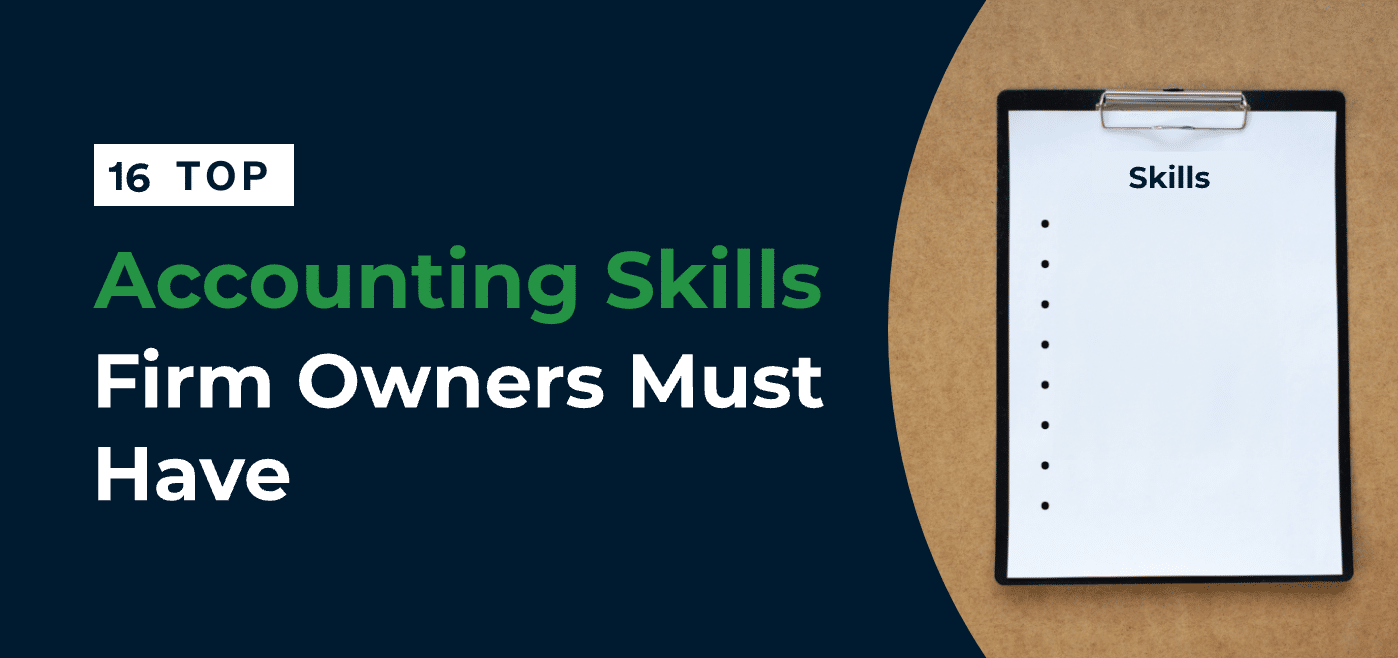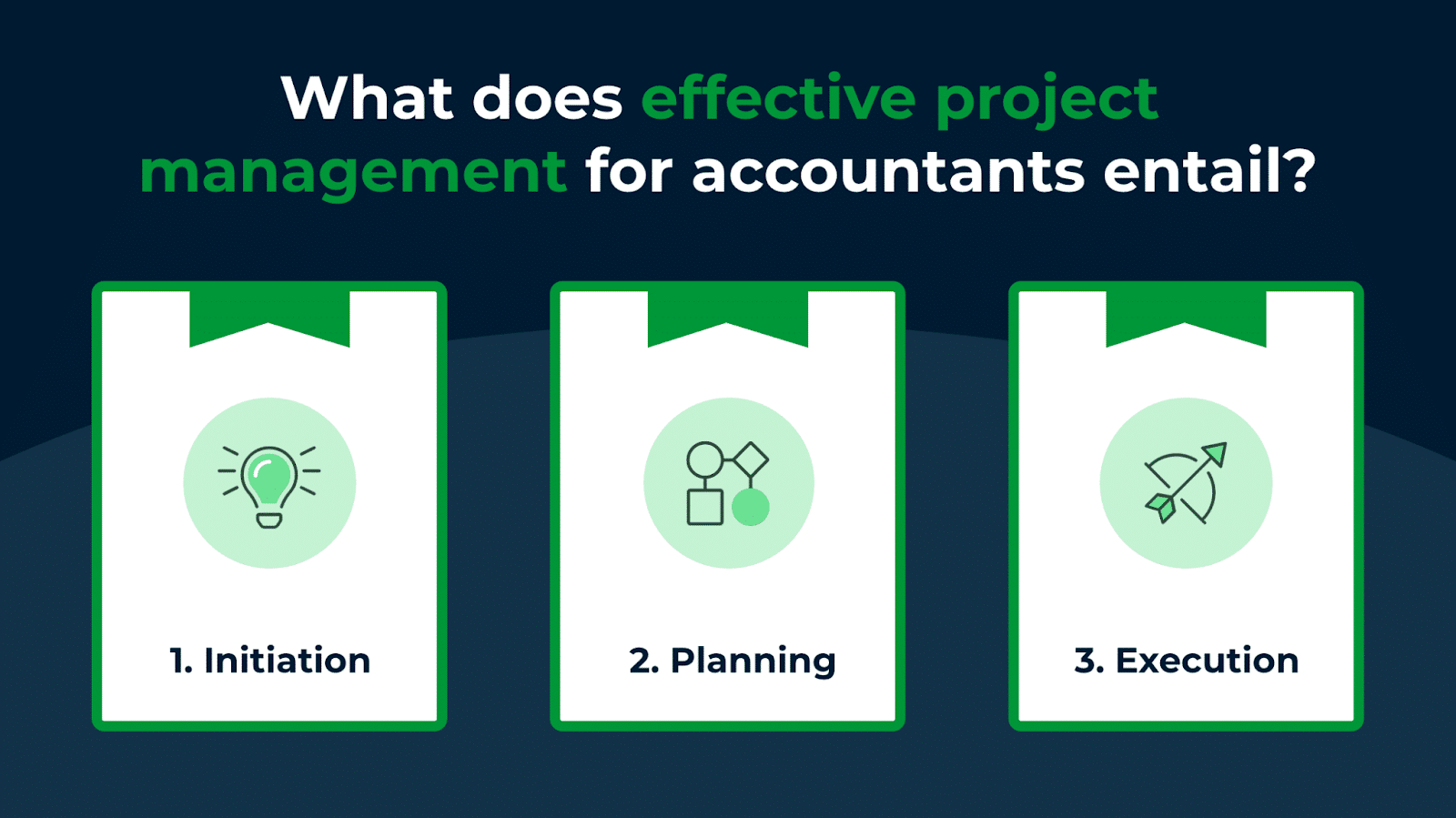Accounting is one of the most populated professions in the U.S. According to the Bureau of Labor Statistics, 1,538,400 people work in the accounting and auditing industry in 2022. 111.14% more than social workers.
But like every other profession, accounting has transformed. The skills required to thrive as an accountant a few years ago have evolved and are somewhat different today.
Now, there is AI for accounting, which can take care of basic tasks, advanced technology to automate some processes, and even evolved human behaviors. This means that some of the skills accountants possessed in the past are now redundant.
To acquire clients and keep your current ones happy, you must learn certain hard and soft skills.
Below are the top 16 accounting skills you should have as an accounting firm owner.
Hard and Soft Skills Accountants Should Possess
Hard Skills
These are the core accounting skills you must have, and they include:
1. Proficiency in Generally Accepted Accounting Principles (GAAP)
According to the Office of Justice Program, “GAAP consists of a common set of accounting rules, requirements, and practices issued by the Financial Accounting Standards Board (FASB) and the Governmental Accounting Standards Board (GASB).”
GAAP ensures the financial reports of US businesses are consistent, transparent, fair, and complete. So, as an accounting professional in the US, you should be GAAP proficient. It is a fundamental requirement for businesses.
2. Data Analysis
“Today, data analytics is perhaps the most important skill set for firms of the future,” said Carl Peterson, Vice President of Small Firms, AICPA. That’s because data analytics can provide helpful insights to help businesses make better decisions, evaluate their performance, and manage risks.
Therefore, if you can, learn advanced Excel and Structured Query Language (SQL)] to add to your credentials. Or make sure the accountants you hire are skilled in this area. In a poll by AICPA, 99% of accounting firms like yours look out for data analysis in new hires.
This skill will prove useful not only internally but also to your clients who need more than basic bookkeeping services.
3. Accounting Software
Your firm can’t function in today’s landscape without a working knowledge of certain software. These programs improve efficiency, and there are many categories, including:
- Accounts receivable software
- Accounts payable automation software
- Accounting practice management: This is our specialty, and we’re proud of our tool — Financial Cents —. Learn more about what we do in 30 seconds.
- Time and billing software
- Budgeting and forecasting software
- Cash flow management software
- Corporate Performance Management (CPM) software
- Corporate tax software
- Credit and collections software
- Invoice management software
- Sales tax and VAT compliance software
4. Knowledge of Regulatory Standards
Firms need to stay up-to-date with the industry’s regulatory standards. Said standards include Sarbanes-Oxley Act (SOX), the Internal Revenue Code (IRC), International Financial Reporting Standards (IFRS), and Statements of Financial Accounting Standards (SFAS) issued by the FASB.
Understanding these standards is essential, as you have to ensure your clients are keeping to them.
5. Familiarity With General Business Practices
The role of accountants now goes past basic bookkeeping to strategic and advisory. Therefore, your practice will be in high demand if you understand general business practices. It means you can contribute strategically to clients’ decisions and impact their growth.
6. Budgeting
Budgeting is a crucial skill, especially for management or corporate accounting firms. These professionals are responsible for financial planning, resource allocation, forecasting, and overall financial management for businesses. With excellent budgeting skills, these tasks become easier.
7. Account Balancing
Balancing accounts is one of the tasks your clients might need your help with. This involves ensuring the accuracy of financial records for auditing and compliance with accounting standards purposes. It’s a basic valuable accounting skill.
8. Financial Reporting
Another highly desirable hard skill is financial reporting knowledge. Accountants are responsible for assessing the financial health of a business and preparing reliable financial statements. So learn how to do this well.
9. Cybersecurity
While this is not a traditional accounting skill, knowing cybersecurity is increasingly important today. Firms deal with sensitive information, which makes them a target for cyber attacks.
Therefore, learn how to safeguard this information and identify threats. You don’t want to risk a lawsuit or lose the trust of your clients if there is a security breach and their private data gets exposed.
See this resource: Cybersecurity for accounting firms guide
9. Accounting Project Management
Growing an accounting firm takes a lot. You have to manage multiple client projects and meet all their individual needs, focus on getting more clients, manage employees, and still complete other day-to-day tasks. Good project management skills help you do all that without overwhelming yourself and burning out.
To manage accounting projects effectively, here are the three stages to keep in mind:
- Initiation: This is where you define the details of the project like start and end dates, scope of work, requirements from both parties, project milestones, etc.
- Planning: This is where you define how you and your team will execute the project. Add the project to your practice management software in this stage, assign and tag duties to your team members, and set the deadlines. You can use Financial Cents for this purpose.
- Execution: This is the stage where you take action to complete the project
Project Management is an important accounting skill to have. Learn about Project Management for accountants in this guide.
Soft Skills
Core skills are essential, no doubt, but people skills are equally as important, if not more, important. So many talented accountants struggle with getting or keeping clients because they lack people skills. That’s because no client can stand a grumpy or ill-mannered accountant, no matter how skilled they are.
For your practice to thrive, here are some important people skills you need.
1. Time Management
As an accountant, you don’t have the luxury of time. You’ll often have many things on your plate, like filing taxes, tracking document submission deadlines, having calls with clients, managing multiple clients, etc. If you can’t manage your time well, you’ll fall behind in your tasks and disappoint your clients.
Disappointing clients is a no-no, so work on your time management skills. You can improve on this by using Financial Cents to automate time-consuming processes and meet all deadlines.
2. Presentation Skills
On occasion, you might need to present financial statements, audit findings, internal reports, etc., to clients or investors. As the firm owner, you want to project confidence, not stumble over your words while presenting.
Remember, a good presentation uses elements beyond spoken words, like nonverbal communication, storytelling techniques, and audience interaction.
3. Written and Verbal Communication
Even though you’re not in a creative or marketing role, great communication skills are essential. Otherwise, how would you convey technical information to clients in a clear, interesting, and relatable manner? It’s a crucial skill to have.
4. Collaboration
Running an accounting firm is not a one-person task. You’ll need to collaborate efficiently with clients, team members, other firms or contractors, vendors (for your clients), etc. If you’re not a good collaborator, it’ll affect the growth of your firm and cause you to lose business relationships.
5. Critical Thinking
Good accountants possess strong critical thinking skills. To Ryan Chabus, CPA, it means “analyzing problems and finding the causes and solutions to those problems.”
The truth is, no matter how much businesses plan and forecast, unforeseen challenges will arise. And so, clients want professionals who can think strategically and on their feet to help solve these challenges.
To develop this ability, Ryan said, “first question how and why processes are done the way they are and ask how they can be done better.”
6. Listening Skills
The last soft skill set to have is active listening. You see, communication is a two-way street. Listening involves paying attention and understanding, before responding to what is being said.
Your customers want to feel like they are being heard. When they come to you with their problems, they want to know you’re actually understanding them, and not pretending to. This makes them feel valued and can improve your relationship with them.
Tips to Grow An Accounting Practice
Asides from the skills listed here, here are a few tips to keep in mind. They will help you grow your practice.
- Network: Never stop networking and building relationships. They can lead to new business opportunities and profitable partnerships. Attend industry events, join professional associations and online accounting communities, and engage with other industry experts on social media.
- Stay updated: The industry is an ever-changing one. Try to keep up with changes in accounting principles, tax laws, and financial regulations. This will ensure your firm’s internal practices and the ones you perform for clients are always compliant. You can stay updated by subscribing to top accounting newsletters, reading blogs and attending industry events.
- Have a growth mindset: Always look for new ways to grow and scale your business. Keep an eye out for new ventures or partnerships that will add value to your firm.
- Embrace technology: Modern accounting relies on technology. It improves efficiency, saving you time and money. So, invest in technology. But before purchasing any tool, do your research first. You don’t want to buy a tool that will leak or sell your sensitive information. Or a tool that won’t perform as advertised, giving you more problems than it’s worth.
- Build a good team: An accounting firm is only as good as its staff. Focus on hiring good and smart people. Treat them well, and invest in their training. It’s for the good of your firm.
Read these 25 practice management tips for accountants by accountants.
Scale Your Firm With Financial Cents
Financial Cents makes running and scaling a firm easy. It helps you get organized, manage your time, and automate pesky, repetitive tasks so you can focus on the money-making activities that will help your firm grow.
Use Financial Cents for Accounting Practice Management.







